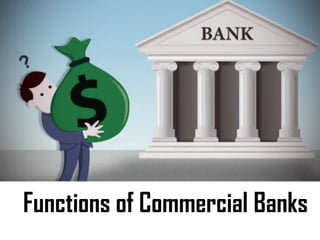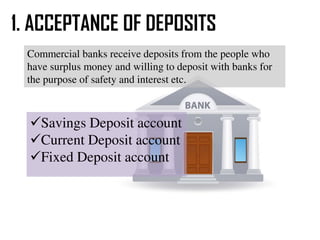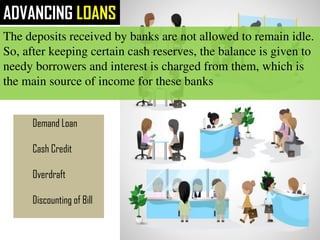Functions of commercial Bank
- 1. Functions of Commercial Banks
- 4. 1. ACCEPTANCE OF DEPOSITS Commercial banks receive deposits from the people who have surplus money and willing to deposit with banks for the purpose of safety and interest etc. ?Savings Deposit account ?Current Deposit account ?Fixed Deposit account
- 5. SAVINGS DEPOSIT ACCOUNT ?Depositor Can make deposit of Money any number of times in a day ?There are restriction on the withdrawals from this account ?This type of account holders can have cheque facility also ?They have interest for the deposited amount . ?It encourage customers savings habit CURRENT DEPOSIT ACCOUNT ?There is no restriction in number of withdrawal per day ?It¡¯s floating deposit account, so there is no interest paid by banker ?But, banks impose service charge for running these account ?Depositor can withdrawal the money from account whenever they need
- 6. FIXED DEPOSIT ACCOUNT ? Money is accepted for a fixed period of time. ? This is called ¡®time deposit¡¯ or ¡®term deposit¡¯ ?The deposited amount cannot be withdrawn before the period of maturity. ?This type of account have very high rate of interest compared to other accounts ?There is no cheque facility for this account holders ?If the customer withdraw the amount before maturity period, bank charges penalty fee early withdraw
- 7. ADVANCING LOANS The deposits received by banks are not allowed to remain idle. So, after keeping certain cash reserves, the balance is given to needy borrowers and interest is charged from them, which is the main source of income for these banks Demand Loan Cash Credit Overdraft Discounting of Bill
- 8. CASH CREDIT ?This loan which can be recalled on the demand by bank at any time. ?The entire sum of demand loan is credited to the account and interest is payable on the entire sum ?The sum of money against some collateral security OVER DRAFT ?This scheme, bankers allows the borrower to overdraw his account through cheque. ?This facility only for respectable and reliable customers & current a/c holders ?Interest is payable by borrower only on the amount overdrawn by him
- 9. DEMAND LOAN ?It refers to a loan given to the borrower against his current assets like shares, bonds, etc. ?A credit limit is sanctioned and the amount is credited in his account. ?The borrower may withdraw any amount within his credit limit ?Interest is charged on the amount actually withdrawn DISCOUNTING BILLS ?This scheme, bankers provides financial accommodation by discounting eligible bills ?Bankers charges commission and the balance amount of bill is provided by way of loan
- 10. CREDIT CREATION This is most significant function of commercial banks, While sanction a loan to a customer, they do not provide cash to the borrower. They open a deposit account from which the borrower can withdraw, and bankers credited amount to that account. INVESTING FUND ?They are investing surplus amount in government securities, stocks etc. ?Earns interest from investment of government securities ?As per act 1994, bankers are invest their funds in government approved securities ?Such investment are made for reason of safety, liquidity, and profitability of funds
- 12. FUND TRANSFER This helps customers in transferring funds from one place to another. This facilities though the instruments such as bank draft, traveller¡¯s cheque, etc. For this service bank collects a commission from the customers FUND COLLECTION Bankers collect funds on behalf of customers from other banks and credit them to their accounts
- 13. FOREIGN EXCHANGE DEALING They are undertake the business of buying and selling foreign currencies, and they charge some commission for exchange TRUSTEE AND THE EXECUTOR Banker is to preserve the ¡®will¡¯ of the customers and to execute its after their death
- 15. LOCKER FACILITY This facility, customers to keep their valuables, like gold ornaments, documents, certificate, etc TRAVELER¡¯S CHEQUES Bankers provides letter of credit, they reduce the customer from risk of carrying cash during travel CREDIT INFORMATION They furnish reliable information about the credit worthiness of the customers to those who are need of information. UNDERWRITING SERVICE They undertakes to subscribe the issue of debenture made by corporate entities. So bankers are providing guarantee and confidence to the investors. And they charging underwriting commission
- 16. AB Bank Limited Bangladesh Commerce Bank Limited Bank Asia Limited Bengal Bank Limited BRAC Bank Limited City Bank Limited Dhaka Bank Limited Dutch-Bangla Bank Limited Eastern Bank Limited IFIC Bank Limited Jamuna Bank Limited Meghna Bank Limited Mercantile Bank Limited Midland Bank Modhumoti Bank Limited Mutual Trust Bank Limited National Bank Limited National Credit & Commerce Bank Limited NRB Bank Limited NRB Commercial Bank Limited One Bank Limited Premier Bank Limited Prime Bank Limited

















